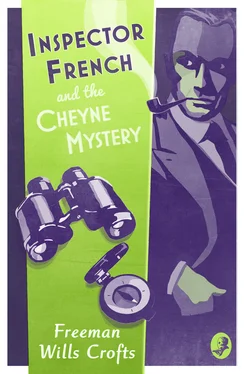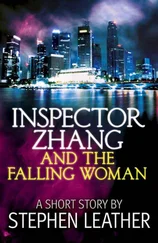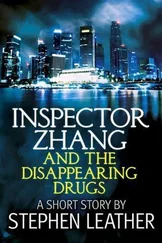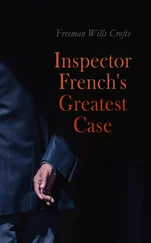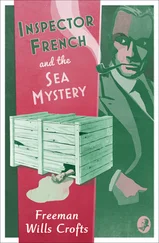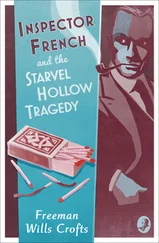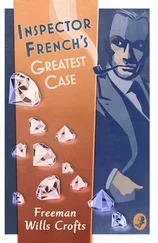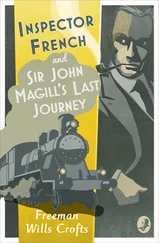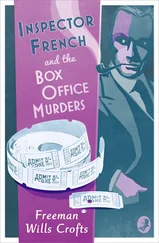Impetuous though he was, Cheyne’s knowledge of human nature told him that in dealing with his fellows the more haste frequently meant the less speed. He therefore curbed his impatience and took a leisurely tone with the boatman.
‘Good-day to you,’ he began. ‘I see you have the Enid there. Is she long in?’
‘’Bout ’arf an hour, sir,’ the man returned.
‘I was to have met her,’ Cheyne went on, ‘but I’m afraid I have missed my friends. You don’t happen to know which direction they went in?’
‘Took a keb, sir: taxi. Went towards the station.’
The station! That was an idea at least worth investigating. He slipped the man a couple of shillings lest his good offices should be required in the future, and hurrying back to his bicycle was soon at the place in question. Here, though he could find no trace of his quarry, he learned that a train had left for Newton Abbot at 3-33—five minutes earlier. It looked very much as if his friends had travelled by it.
For those who are not clear as to the geography of South Devon, it may be explained that Newton Abbot lies on the main line of the Great Western Railway between Paddington and Cornwall, with Exeter twenty miles to the north-east and Plymouth some thirty odd to the south-west. At Newton Abbot the line throws off a spur, which, passing through Torquay and Paignton, has its terminus at Kingswear, from which there is a ferry connection to Dartmouth on the opposite side of the river. From Torquay to Newton Abbot is only about six miles, and there is a good road between the two. Cheyne, therefore, hearing that the train had left only five minutes earlier and knowing that there would be a delay at the junction waiting for the main line train, at once saw that he had a good chance of overtaking it.
He did not stop to ask questions, but leaping once more on his machine, did the six miles at the highest speed he dared. At precisely 4-0 p.m. he pushed the bicycle into Newton Abbot station, and handing half a crown to a porter, told him to look after it until his return.
Hasty inquiries informed him that the train with which that from Torquay connected was a slow local from Plymouth to Exeter. It had not yet arrived, but was due directly. It stopped for seven minutes, being scheduled out at 4-10 p.m. On chance Cheyne bought a third single to Exeter, and putting up his collar, pulling down his hat over his eyes and affecting a stoop, he passed on to the platform. A few people were waiting, but a glance told him that neither Price nor Lewisham was among them.
As, however, they might be watching from the shelter of one of the waiting-rooms, he strolled away towards the Exeter end of the platform. As he did so the train came in from Plymouth, the engine stopping just opposite where he was standing. He began to move back, so as to keep a sharp eye on those getting in. But at once a familiar figure caught his eye and he stood for a moment motionless.
The coach next the engine was a third, and in the corner of its fourth compartment sat Lewisham!
Fortunately he was sitting with his back to the engine and he did not see Cheyne approaching from behind. Fortunately, also, the opposite corner was occupied by a lady, as, had Price been there, Cheyne would unquestionably have been discovered.
Retreating quickly, but with triumph in his heart, Cheyne got into the end compartment of the coach. It was already occupied by three other men, two sitting in the corner seats next the platform, the third with his back to the engine at the opposite end. Cheyne dropped into the remaining corner seat—facing the engine and next the corridor. He did not then realise the important issues that hung on his having taken up this position, but later he marvelled at the lucky chance which had placed him there.
As the train proceeded he had an opportunity, for the first time since embarking on this wild chase, of calmly considering the position, and he at once saw that the fugitives’ moves up to the present had been dictated by their circumstances and were almost obligatory.
First, he now understood that they must have landed at Brixham, Paignton or Torquay, and of these Torquay was obviously most suitable to their purpose, being larger than the others and their arrival therefore attracting correspondingly less attention. But they must have landed at one of the three places, as they were the only ports which they could reach before he, Cheyne, would have had time to give the alarm. Suppose he had lodged information with the police immediately on getting ashore, it would have been simply impossible for the others to have entered any other port without fear of arrest. But at Paignton or Torquay they were safe. By no possible chance could the machinery of the law have been set in motion in time to apprehend them.
He saw also how the men came to be seated in the train from Plymouth when it reached Newton Abbot, and here again he was lost in admiration at the way in which the pair had laid their plans. The first station on the Plymouth side of Newton Abbot was Totnes, and from Torquay to Totnes by road was a matter of only some ten miles. They would just have had time to do the distance, and there was no doubt that Totnes was the place to which their taxi had taken them. In the event, therefore, of an immediate chase, there was every chance of the scent being temporarily lost to Torquay.
These thoughts had scarcely passed through Cheyne’s mind when the event happened which caused him to congratulate himself on the seat he was occupying. At the extreme end of the coach, immediately in advance of his compartment, was the lavatory, and at this moment, just as they were stopping at Teignmouth, a man carrying a small kitbag passed along the corridor and entered. Approaching from behind Cheyne, he did not see the latter’s face, but Cheyne saw him. It was Price!
Cheyne took an engagement book from his pocket and bent low over it, lest the other should recognise him on his return. But Price remained in the lavatory until they reached Dawlish, and here another stroke of luck was in store for Cheyne. At Dawlish, at which they stopped a few moments later, his vis-à-vis alighted, and Cheyne immediately changed his seat. When, therefore, just before the train started, Price left the lavatory, he again approached Cheyne from behind and again failed to see his face.
As he passed down the corridor Cheyne stared at him. While in the lavatory he had effected a wondrous change in his appearance. Gone was now the small dark moustache and the glasses, his hat was of a different type and his overcoat of a different colour. Cheyne watched him pause hesitatingly at the door of the next compartment and finally enter.
For some moments as the train rattled along towards Exeter, Cheyne failed to grasp the significance of this last move. Then he saw that it was, as usual, part of a well-thought-out scheme. Approaching Teignmouth, Price had evidently left his compartment—almost certainly the fourth, where Lewisham sat—as if he were about to alight at the station. Instead of doing so, he had entered the lavatory. Disguised, or, more probably, with a previous disguise removed, he had left it before the train started from Dawlish, and appearing at the door of the second compartment, had attempted to convey the idea, almost certainly with success, that he had just joined the train.
A further thought made Cheyne swing across again to the seat facing the engine. They were approaching Starcross. Would Lewisham adopt the same subterfuge at this station? But he did not, and they reached Exeter without further adventure.
The train going no further, all passengers had to alight. Cheyne was in no hurry to move, and by the time he left the carriage Price and Lewisham were already far down the platform. He wished that he in his turn could find a false moustache and glasses, but he realised that if he kept his face hidden, his clothes were already a satisfactory disguise. He watched the two men begin to pace the platform, and soon felt satisfied that they were proceeding by a later train.
Читать дальше
